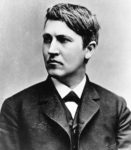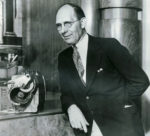Podcast: Play in new window | Embed
 This week in 1877 – Thomas Edison wrote a letter to the president of the Telegraph Company in Pittsburgh, PA. The letter stated his feelings that the word, “hello” would be a more appropriate greeting when answering the phone, than “ahoy,” which was suggested by Alexander Graham Bell.
This week in 1877 – Thomas Edison wrote a letter to the president of the Telegraph Company in Pittsburgh, PA. The letter stated his feelings that the word, “hello” would be a more appropriate greeting when answering the phone, than “ahoy,” which was suggested by Alexander Graham Bell.
1888 – An audio recording of English composer Arthur Sullivan’s “The Lost Chord”, one of the first recordings of music ever made, was played during a press conference introducing Thomas Edison’s phonograph in London, England.
1915 – Charles Kettering of Dayton, Ohio patented the electric, automobile self-starter. In the early years of the automobile, drivers used iron hand cranks to start the internal combustion process that powered the engines on their cars. If the driver forgot to turn his ignition off before turning the crank, the car could backfire or roll forward, as at the time most vehicles had no brakes. Clearly a better system was needed, and in 1911 Cadillac head Henry M. Leland gave Charles Kettering the task of developing one.
 1958 – Pioneer 0, America’s first attempt at lunar orbit, is launched using the first Thor-Able rocket and fails. Notable as one of the first attempted launches beyond Earth orbit by any country.
1958 – Pioneer 0, America’s first attempt at lunar orbit, is launched using the first Thor-Able rocket and fails. Notable as one of the first attempted launches beyond Earth orbit by any country.
And this week in 1982 – The first Compact Discs were released to the public in Hanover, Germany. One thing we remember about CDs was their ability to hold 74 minutes of music. Why 74? According to many reports, the wife of Sony’s vice president decided that she wanted Beethoven’s Ninth Symphony to fit on a CD. The longest known recording of that performance was, you guessed it… 74 minutes.

